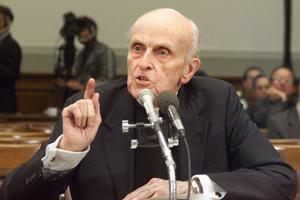Jesuit Father Paul Mankowski’s Clear, Catholic Fight-Not-Flight Blueprint
BOOK PICK: Jesuit at Large provides much-needed light in difficult times.

Jesuit at Large: Essays and Reviews by Paul Mankowski, S.J.
Edited by George Weigel
Ignatius Press, 2021
197 pages, $15.26 (paperback)
Order here.
In September of 2020, Jesuit Father Paul Mankowski died suddenly of a brain aneurysm. His death was a profound shock to his friends and a great loss for the Church. He was an authentic son of St. Ignatius, a faithful priest and a constant friend.
His writings over several decades provided much-needed light and clarity — and humor. His death deprived us of a great example of the Jesuit vocation and a lucid guide in difficult times. It’s tragic that, given the current confusion in the Church and broader culture, we should be deprived of his insight.
Ignatius Press has blunted that tragedy slightly and done the Church a great service by publishing Jesuit at Large: Essays and Reviews by Paul Mankowski, S.J. From this book we continue to benefit from Father Mankowski’s prose and wit. That his analyses and diagnoses, spanning 30 years, still apply today is both a testament to his acumen and a sad reminder of how enduring the problems are.
I first encountered Father Mankowski’s writings when I was a student at the College of the Holy Cross. My friends and I were pushing back against the leftist politics, liturgical silliness and doctrinal confusion on that Jesuit campus. I had discovered Father Mankowski’s essays in Crisis and the newly founded First Things. They were a breath of fresh air.
Here was a priest — a Jesuit, no less — taking on and destroying the same liberal canards we saw all around us. And he was doing so with such erudition and piercing wit. He confirmed that we weren’t crazy to push back on these things. One could not only fight them but do so with fun.
Several years later, now in the seminary, I had the good fortune to become friends with Father Mankowksi when he was teaching at the Biblicum in Rome. Over the next three years I came to benefit directly from his always clear advice and priestly encouragement. Although he was not “pious” as most people would understand that word, he was a man of real devotion and genuine piety. He provided a great example of a manly, intelligent and generous priest.
Holding degrees from The University of Chicago, Oxford and Harvard, Father Mankowski was a first-rate scholar. But that only partly explains the brilliance and lucidity of his writings. His Midwest upbringing and simple Catholic piety bring to his words a common sense and straightforwardness typically lacking in academia. He was a scholar who took the side of the faithful against supercilious academicians.
He was a first-rate polemicist, exposing and demolishing his opponents’ arguments with extraordinary ease. A boxer himself, he once explained to me that every other sport is based on man’s instinct of flight. Boxing alone is based on our instinct of fight.
He himself showed this instinct in his willingness to engage the battles of the day. But it wasn’t the fight itself that he sought. As these essays show, Father Mankowski’s first concern was for the Church’s integrity, for the simple faith of the people, for the salvation of souls. Those are worth the fight.
Still, to limit Father Mankowski to polemics would be unfair. Beware of the man who is only a polemicist. One of the finest pieces in this volume is Father Mankowski’s reflection on the Immaculate Conception. Every year on that feast, as I consider how to preach the mystery, I’m tempted simply to steal his reflection wholesale and preach it as my own.
I’ve never encountered a better articulation not only of the doctrine but also of its meaning here and now. That essay, perhaps more than any other in this volume, reveals Father Mankowski’s winning combination of simple devotion and profound learning.
The collection also reveals Father Mankowski as a great chronicler of our times. One essay is entitled “What Went Wrong?” In a sense, that’s a fitting title for the entire book.
We look around and wonder, How did we get where we are? Father Mankowski expertly guides us through our own times and explains not only how we got here but, more importantly, how to get out. In an age of constant wordsmithing and prevarications, it’s refreshing to encounter his candor once again. An illness can’t be cured unless it’s diagnosed.
One of the last times I spoke with Father Mankowski was in Rome, right outside the Jesuit generalate. After we shook hands and I turned to go my way, he stopped me and made one simple request: “Rattle the beads for me.” Now, rereading his works, I’m reminded of the Church’s debt to him, of my debt to him, and of the need to fulfill that request again.
















